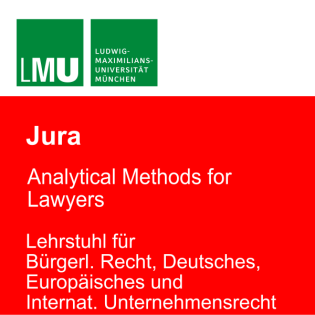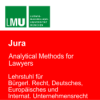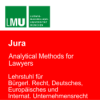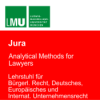
LMU Analytical Methods for Lawyers - Lehrstuhl für Bürgerliches Recht, Deutsches, Europ. und Int. Unternehmensrecht
Podcaster
Episoden

19.04.2019
2 Stunden 3 Minuten
Contracting - Example: Your next tenancy agreement; Why exchange
goods and services?; The Edgeworth box: Tea or coffee?; Why
contracts?; Complete contracts; Contracts and the law; Adverse
selection vs. moral hazard; Adverse selection: The reaction cy...

19.04.2019
1 Stunde 53 Minuten
Game Theory - Decision theory vs. game theory; A typical legal
application of game theory; Some applications of game theory in
legal settings; Representation of games; Normal-form games; The
prisoner's dilemma; Prisoner's dilemma in litigation; Solut...

1 Stunde 58 Minuten
Individual Finance - What is finance?; Individual Finance; Finance
and Lawyers; The time value of money; The time price of
money;Compound interest; The effect of compound interest; Example:
An investment decision; Example: Refined litigation risk ana...

3 Stunden 49 Minuten
Decision Theory - Fundamental concepts; Expected value; Cumulative
Probabilities; Serially cumulative probabilities; Decision trees;
TreeAgePro and other software for litigation risk analysis;
Difficulties in building the tree; Discounting and risk
p...

19.04.2019
56 Minuten
Due to software failure this podcast covers only the first part of
unit 4; we are currently working on restoring the second part.
Accounting - Accounting and Lawyers; Why Accounting?; Financial
Statements; Financial statements in the media; The funda...
Über diesen Podcast
Law students are routinely taught how to gather facts, interpret
legal texts, and apply legal rules to established facts. These
techniques are and will always be important to all lawyers,
regardless of their position and practice. However, they do not
suffice. Lawyers in almost every area of practice (litigation,
corporate, government, public interest, etc.) must be familiar with
analytical concepts and methods that go beyond fact gathering and
interpretative legal skills in order to be successful. This course
covers the basics of the methods. It will provide you with a
fundamental understanding that allows you to apply them when
necessary in legal practice. This course is designed to be fully
accessible to those with no prior quantitative training or
background in the subjects covered. However, a high school level of
mathematics is required.





Kommentare (0)